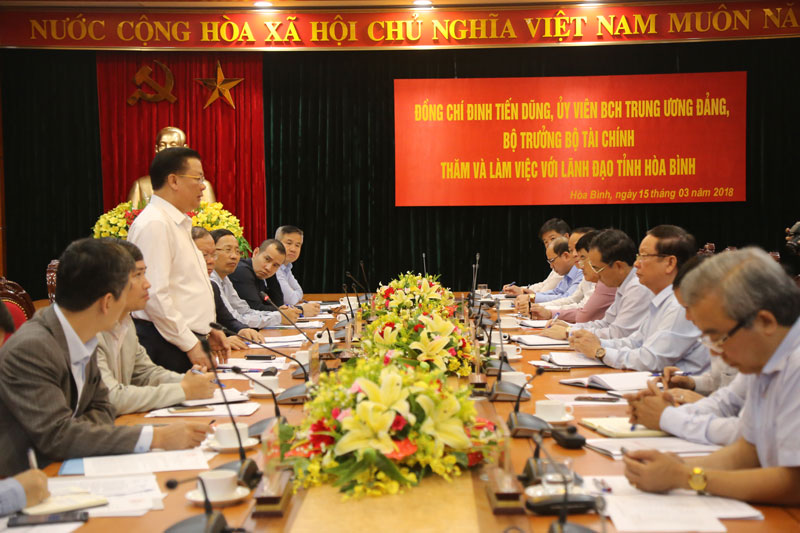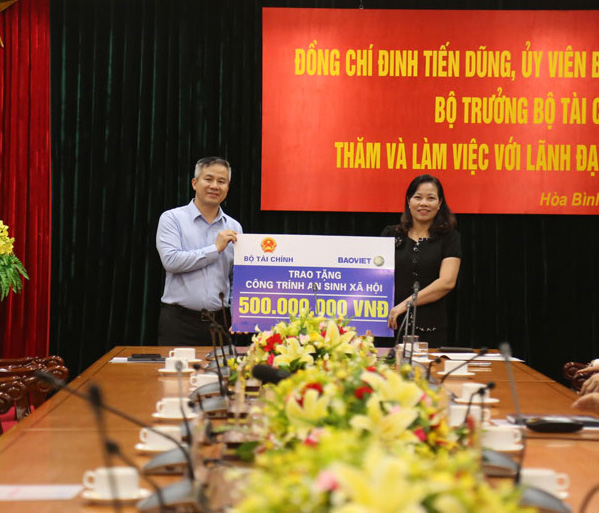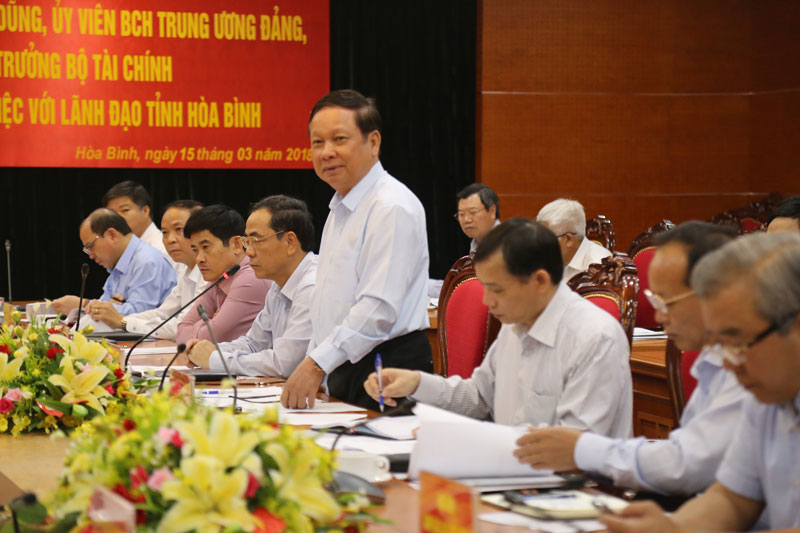
(HBO) – Minister of Finance Dinh Tien Dung had a working session with authorities from the northern province of Hoa Binh to review the local socio-economic performance, finance-budget work, and prevention of trade fraud in 2017 and set new tasks for 2018.
Local leaders include Secretary of
the provincial Party Committee Bui Van Tinh, Vice Secretary of the provincial
Party Committee and Chairman of the provincial People’s Committee Nguyen Van
Quang.

Minister of Finance Dinh Tien Dung speaks at the
working session
Secretary
of the provincial Party’s Committee Bui Van Tinh at the working session with
the Ministry of Finance
Senior officials from Hoa Binh province proposed
the Ministry of Finance soon promulgate a circular guiding the settlement of
public assets; allow Hoa Binh hydropower company to enjoy 100 percent of water
resources tax; supplement capital for the money printing factory project;
support local budget for helping residents in the area of Hoa Binh lake;
implement urgent projects to address landslides in Hoa Binh city and remove
households in affected areas to safer areas; and support the locality to soon
start the construction of Hoa Binh bridge with total investment of nearly 750
billion VND.
Concluding the event, Minister of Finance Dinh
Tien Dung asked the province to push ahead with coordination with the ministry
to implement synchronous measures to restructure State budget, ensure public
debt safety, and prevent trade fraud. The minister acknowledged the provincial
recommendations and promised to have specific policies for hydropower plants’
water resources tax, incentives for specialised businesses, and support for
households and small-and medium-sized enterprises to boost production and
trade.

Bao Viet
Group under the Ministry of Finance aided 500 million VND to rebuild schools at
Giap Dat secondary school (Da Bac).
Regarding landslides in some areas, the minister asked to soon arrange
financial resources to deal with this prolonged risk and stabilise lives of
people in the area of Hoa Binh lake. He voiced his support for the investment for
the construction of Hoa Binh bridge, but it must follow a roadmap and refer to
opinions of the Ministry of Planning and Investment and the Ministry of
Transport.
On the occasion, the ministry’s Bao Viet Group
provided 500 million VND for the province to rebuild schools at Giap Dat
secondary school (Da Bac) affected by floods./.
Mai Chau district has firmly established itself as a standout destination on Vietnam’s tourism map, attracting both domestic and international visitors with its breathtaking landscapes, rich ethnic culture, and warm hospitality. However, beyond its natural and cultural charm, a secure and well-managed tourism environment has added to Mai Chau’s appeal.
As Vietnam enters a new phase of economic and administrative reform in 2025, Hoa Binh province is stepping up its efforts to streamline governance, boost economic growth, and attract investment.
The Hoa Binh provincial People's Committee held its monthly meeting on March 26 to review the progress of key projects, assess budget revenue and public investment disbursement, provide feedback on draft documents for submission to the provincial Party Committee's Standing Board, and discuss other important matters related to the committee's governance activities.
Playing a key role in Hoa Binh province’s economic development, Luong Son district has been focusing on science and technology development, innovation, and digital transformation.
Identifying the application of online public services as a key step in administrative procedure reform and e-government building, Kim Boi district has proactively provided services and supported residents and businesses in accessing and utilising full-process online public services promptly and efficiently. The locality aims to lift the rate of end-to-end online public services to over 90%, with all officials and civil servants handling tasks in the digital environment.
Nguyen Anh Tuyet, hailing from a family steeped in the ancient art of herbal medicine, is transforming local medicinal herbs into high-value concentrated extracts, elevating their worth and healing potential.





